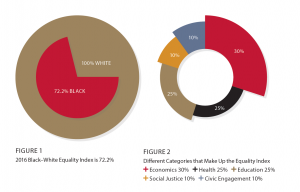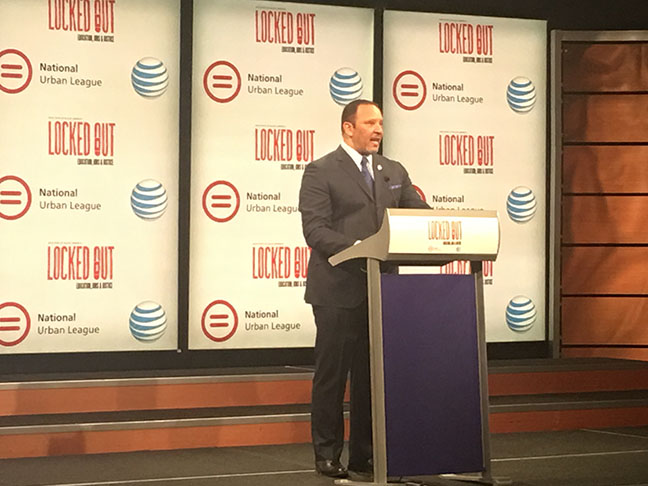WASHINGTON – Eight years into our first African-American presidency and amid an increasingly racialized election cycle, what can we say about the state of black America? According to a new report by the National Urban League, it’s mixed: African Americans have made strides but a clear opportunity gap persists.
According to the report, ‘Locked Out: Education, Justice & Jobs,’ black Americans are 72.2 percent equal to white Americans. This is based on the organization’s equality index, which measures how well black Americans and Hispanics are doing compared to whites in terms of economics, health, education, social justice, and civic engagement. The index stood at 72 percent last year, essentially staying flat as the nation slowly emerged from the Great Recession.
The National Urban League, a non-partisan civil rights organization, wants a commitment of $1 trillion over the next five years to aid minority and women-owned businesses – or as the league puts it, a Main Street Marshall Plan. The league also recommends a federal “living wage” of $15 per hour, indexed to inflation. The current federal minimum wage is $7.25.
The findings and recommendations were released Tuesday at the Newseum, a few blocks from Capitol Hill where efforts to raise the minimum wage have been stymied.
Michelle Hudgins, senior communications strategist at the National Education Association, said African Americans still lack adequate political and economic representation, relative to the $1.1 trillion in spending they pour into the American economy.

Equality Index from the State of Black America report released by the Urban League
“We do not get the fair share of the opportunity to share our perspective and our voice,” said Hudgins, a partner in the State of Black America web series. “I think those are the things that should be the priority of the next administration.”
One way to share their voice is through their votes. “We need to re-introduce to our younger generation the idea of civic engagement and activism so that there’s an accountability in our community that we seem to lack sometimes,” Hudgins said.
Amanda Bonam, 20, a senior at Howard University who was in the audience at the Newseum, agrees, saying black Americans need to boost their engagement in the democratic process.
“I think engagement is extremely important … staying informed is paramount,” she said in an interview.
While the National Urban League report records a dip in black voter turnout in the past 40 years — from 49 percent in the 1976 presidential year to 40 percent in the 2014 midterms — it notes that “the gap between blacks and whites has narrowed … suggesting that Black civic engagement has declined by less than that of whites.”
Hillary Clinton, the likely Democratic presidential nominee, is counting on a strong turnout among black and Hispanic voters as a part of her strategy for capturing the White House in November. But the question is whether she’ll be able to draw the historic numbers that elected Barack Obama, whose presidency, National Urban League President Marc Morial acknowledged, has clearly influenced black America.
“… we cannot in eight short years eliminate America’s longstanding challenges around racial inequity, but your presidency has given it new energy,” he said.
Read the full report and more here.


